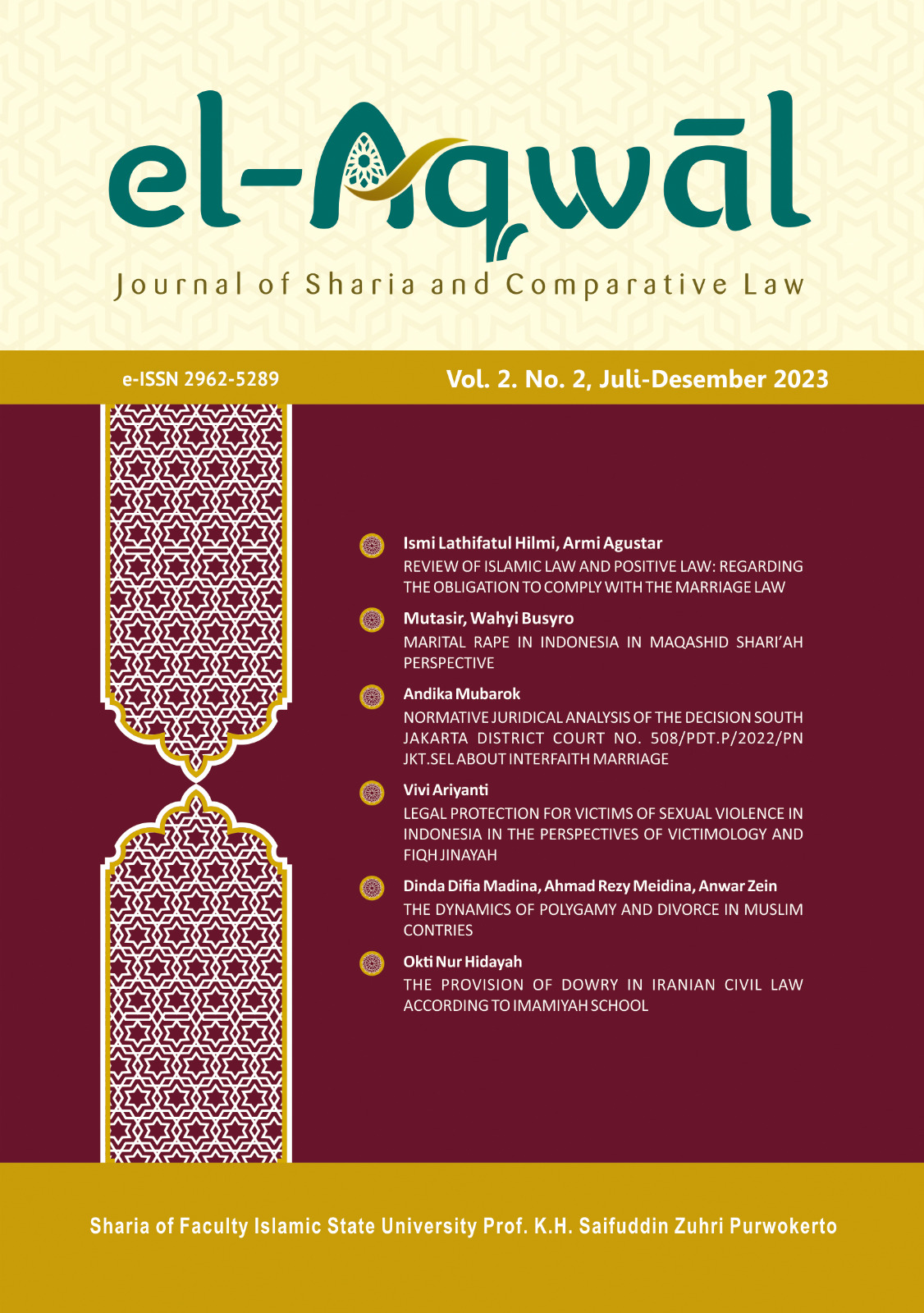The Dynamics of Polygamy and Divorce in Muslim Countries
DOI:
https://doi.org/10.24090/el-aqwal.v2i2.9410Keywords:
poligamy, divorce, muslim countriesAbstract
This article talks about the practice of Islamic family law in the Muslim world; Türkiye, Pakistan, and Indonesia which focus on polygamy and divorce. Talking about polygamy and divorce must be familiar to many people because polygamy is a very sensitive scourge when someone does that. Likewise, with divorce, this kind of thing becomes the subject of gossip in society when a family gets divorced. This paper will explain how family law is in the Muslim world, especially Turkey, Pakistan, and Indonesia with the main study of polygamy and divorce which aims to understand the understanding of society from all walks of life regarding the discussions between the two. This research is a literature study that focuses on discussing polygamy and divorce in three Muslim countries; Türkiye, Pakistan, and Indonesia. The data collection method in this study used documentation, namely collecting books, notes, and others that had relevance to the research, which were then analyzed. The results of this study are; (1) Turkey prohibits polygamy, which is contained in the book of the Ottoman Law of Family Rights, Pakistan also prohibits polygamy until written permission from the wife and the arbitral council, Indonesia legalizes polygamy referring to the Marriage Law. (2) Turkey in the event that a divorce ends with the finalization of a court decision and a waiting period of 300 days stipulated by the Turkish Civil Code, likewise Pakistan regulates divorce in two different rules, one using the Dissolution of Muslim Marriage and the other using Muslim Family Law Ordinance, divorce in Indonesia is regulated in Marriage Law Number 1 of 1974.Downloads
References
A. Jawad, Haifaa, 2002, Authenticity of Women's Rights : Islamic Perspectives on Gender Equality, (: Fajar Pustaka Baru, Yogyakarta.
Aibak Kutbuddin, 2017, Contemporary Fiqh Studies : Kalimedia, Yogyakarta.
Aktas Ozgul 2011: Reasons for Divorce and Difficulties Faced After Divorce, (DEU Institute Of Educational Science, Turkey.
Barrister Ali Shaikh, 2022, Article, Law of Divorce and Khula In Pakistan, p. 4 . https://doctplayer.net accessed Wednesday 16 March.
Cherry Kristen, 2001, "Marriage and Divorce Law in Pakistan and Iran: The Problem of Recognition”, Tulsa J. Comp. & Int'l L.No. 9.
Dara Quthni Effida Eza Aulia and 2018, 'Codification of Islamic Law in Indonesia in the Perspective of Legal Certainty', Ius Civile: Reflections on Law Enforcement and Justice, 2.2
Darajat, Furqan 2016, " Polygamy Status in Legislation Conventional and Contemporary and Their Relevance to Surah An-Nisa' verse 3”, Al-Manhaj: Journal of Indonesian Islamic Family Law , Vol. 2, No. 1.
Fajar Nurhardianto, 2015, "Legal System and Indonesian Legal Position", Tapis Journal: Binocular Journal of Islamic Political Aspirations, Vol. 11, no. 1.
Herliany, 2016, “Flurring of Norms Requirements for Doing Polygamy in Article 4 Paragraph (2) Letters (a and b) of Law Number 1 Year 1974 About Marriage", Collection of Law Faculty Student Journals , Vol. 4, No. 3.
Khoirul Fata, Fauzan and Ahmad, 2018 Models of Sharia Implementation in Modern Countries (Case Studies of Saudi Arabia, Iran, Turkey, and Indonesia, Al-Manahij: Journal of Islamic Law Studies, 12.1 UIN Jakarta: Jakarta.
Kuna, 1961, Papers, Divorce in Pakistan Legislation (Critical Research On The Divorce Act 1939 and MFLO.
L Esposito John , 2001, The Oxford Encyclopedia of The Modern Muslim World, trans. Eva YN et al, Oxford Encyclopedia: the modern Islamic world . Mizan: Bandung.
Mardiani, 2011 Islamic Marriage Law in the Modern Islamic World , : Graha Ilmu, Yogyakarta.
Millati Arifah, 2017 'Renewal of Islamic Law', Journal of Islamic Thought, 28.2
Mudzhar M. Atho, 2014, "Family Law in Pakistan (Between Islamization And Customary Pressure)", Al-'Ada , Vol. 12, No. 1.
Nurhardianto Fajar, 2015, "Legal System and Legal Position Indonesia", Tapis Journal: Journal of Islamic Political Aspirations Binoculars, Vol. 11, No. 1.
Prihartinih Tri Lisiani, 200 8, " Philosophical Review of Law Number 1 of 1974" , Journal of Legal Dynamics Vol . 8 No. 2 May .
Rohmadi, 2014, “Shari'ah and family law politics in the country Pakistan", Mizani Scientific Journal: Legal Discourse, Economics, and Religion, Vol. 1.No. 2.
Sabaruddin Ahmad, 2019, “Examining the Rigidity of Islamic Family Law In Pakistan”, Al-Maslahah , Vol. 15, No. 1.
Tahir Mahmood, 1972, Family Law Reform in the Muslim World : NM Tripathi, Bombay.
Wahyuni Sri, '2013 Renewal of Islamic Family Law in Muslim Countries ', Al-Ahwal, 6.2
Zuhdi Saifuddin 2016, Reformulation of Divorce Law in Pakistan, Muhammadiyah University of Surakarta, Journal of Law and Justice Vol. 1 No. October 1st.
Downloads
Published
How to Cite
Issue
Section
License
Copyright (c) 2023 Dinda Difia Madina, Ahmad Rezy Meidina, Anwar Zein

This work is licensed under a Creative Commons Attribution-ShareAlike 4.0 International License.
Authors who publish with this journal agree to the following terms: Authors retain copyright and grant the journal right of first publication with the work simultaneously licensed under a Creative Commons Attribution-ShareAlike 4.0 International License that allows others to share the work with an acknowledgment of the work's authorship and initial publication in this journal.












